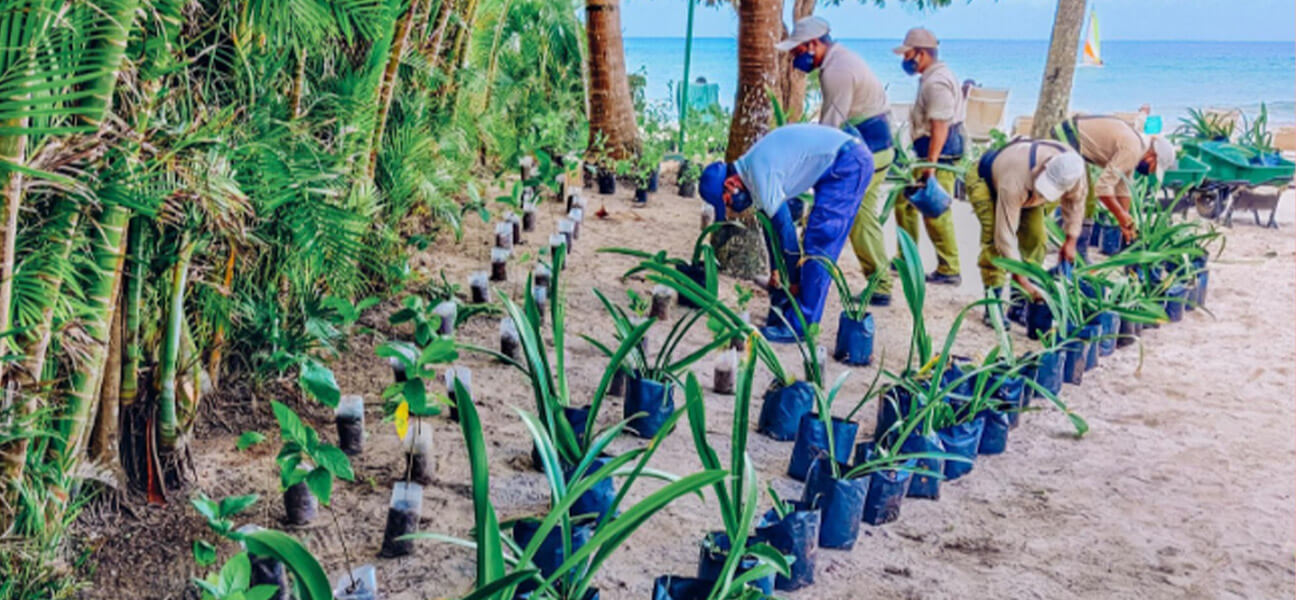Iberostar Hotels & Resorts is moving toward carbon neutrality by 2030, a milestone it aims to reach 20 years ahead of the global target set by the industry. In 2023, compared to 2019, Iberostar reduced its Scope 1 and 2 emissions by 12% globally: 6% in the Americas region—of which Mexico reports 26% and Brazil 21%—and 32% in the Europe region.
“Our commitment to responsible tourism leads our business on a transformative journey,” said Gloria Fluxà, vice-chairman/chief sustainability officer, Iberostar Group. “The successful implementation of our vision requires a 360-degree approach, embedding sustainability within every process, aligning with nature and mitigating risks. For instance, implementing nature-based solutions like restoring coral reefs or mangroves to mitigate hurricane impact. Collaborations such as these can aid in developing proactive solutions, partnering with local governments can address major infrastructure challenges and involving local communities can further holistic tourism. Through collective collaboration, our aim is to inspire positive change so that we create a future where people and the environment flourish.”
Energy reduction & commitment to green hydrogen
Iberostar has also reduced its energy consumption (kWh) by 6.5% compared to 2019, with the hotels in the Americas achieving 6.63%. Iberostar hotels in Cozumel (9.38%) and Cancun (10.12%) in Mexico; Costa Dorada (9.36%) in the Dominican Republic; and Rose Hall (12.28%), in Jamaica, have achieved some of the largest reductions in the region through the implementation of best practices and key investments in hotels.
Last year, the company constructed a 1.2 MWp photovoltaic plant at the Rose Hall Resort, collaborating in the production of clean energy for the local hotel. In addition, the process of conditioning the ground for two photovoltaic plants in the Dominican Republic was initiated, paving the way for an expanded renewable energy capacity. In addition to this work in search of electrification, in 2023, the global strategy also included the progressive replacement of gas boilers with heat pumps in several locations in Mexico, contributing to the reduction of carbon footprint.
The focus in 2024 is on the East End Morrant project on St. Thomas. With a commitment to reach 8,000 tons of CO2 through the conservation and reforestation of mangroves, a preliminary report has already been prepared for the site. A Memorandum of Understanding (MOU) with the University of the West Indies is being finalized and will establish collaborative activities related to mangrove conservation, reforestation and carbon sequestration. In addition, a contract was signed for the implementation of the Environmental Impact Study, which will be carried out by the Discovery Bay Marine Laboratory at the University of the West Indies.
Less waste to landfill
In 2023, the company reduced the overall percentage of waste in its hotels, waste sent to landfill and waste derived from food. Specifically, through its 3R’s team and different initiatives, Iberostar reduced waste sent to landfill by 56% relative to its 2021 baseline.
83% of the seafood consumed at Iberostar hotels comes from responsible sources
As part of Iberostar’s goal of ensuring that 100% of fish and seafood served in Iberostar hotels is responsible, Iberostar has achieved 83% thus far, five percentage points above last year’s data. Mexico was the first region to achieve the target, reaching 100% responsible consumption of seafood two years ago.
This achievement also contributes to the broader goal of promoting environmental stewardship in the seafood industry. Iberostar is working with fishing communities in specific destinations, such as the Aliança Kirimurȇ in Brazil, where it collaborates with a collective of fishermen and shellfish gatherers in the All Saints Bay region of Brazil. The Kirimurê Alliance focuses on improving the quality and sustainability of seafood production, providing support to 200 families involved in fishing and related activities. Three-quarters of the participants are women, illustrating the commitment for sustainable, environmental and social development. Iberostar’s participation has resulted in improving processing facilities and distribution channels, contributing to the development of a sustainable fishing industry in Brazil.
Coral nurseries for the conservation of the environment
In 2023, Iberostar incorporated two new coral nurseries in the Dominican Republic, bringing its total to eight nurseries, four in the Dominican Republic, three in Mexico and one in Jamaica. Through the labs, Iberostar scientists will continue studying the behavior and adaptation of these species against climate change and to establish a genetic bank of coral species.
Simultaneously, since restarting Iberostar’s mangrove restoration program in 2021, the company has planted more than 16,100 mangroves of different varieties in the Dominican Republic. In addition, the chain has continued to implement local initiatives and collaborations to promote dune restoration in Mexico.
Challenges for the future
Iberostar also identifies some of challenges it faces in the near future as it works towards the goals of its 2030 Agenda:
- Offset remaining emissions that are not easily achievable through decarbonization through innovative carbon capture projects, with a focus on blue carbon initiatives. Projects prioritize biodiversity conservation, sustainable ecosystem management and community inclusion for their economic benefit.
- Continue the electrification of hotels to amplify the innovation projects.
- Create quality partnerships throughout the value chain to continue to reduce Scope 3 emissions, including aligning with its suppliers on carbon measurement standards, building relationships that foster collaboration with key suppliers, with the aim of generating tangible leaps of progress rather than attempting to dilute smaller actions across its value chain.
